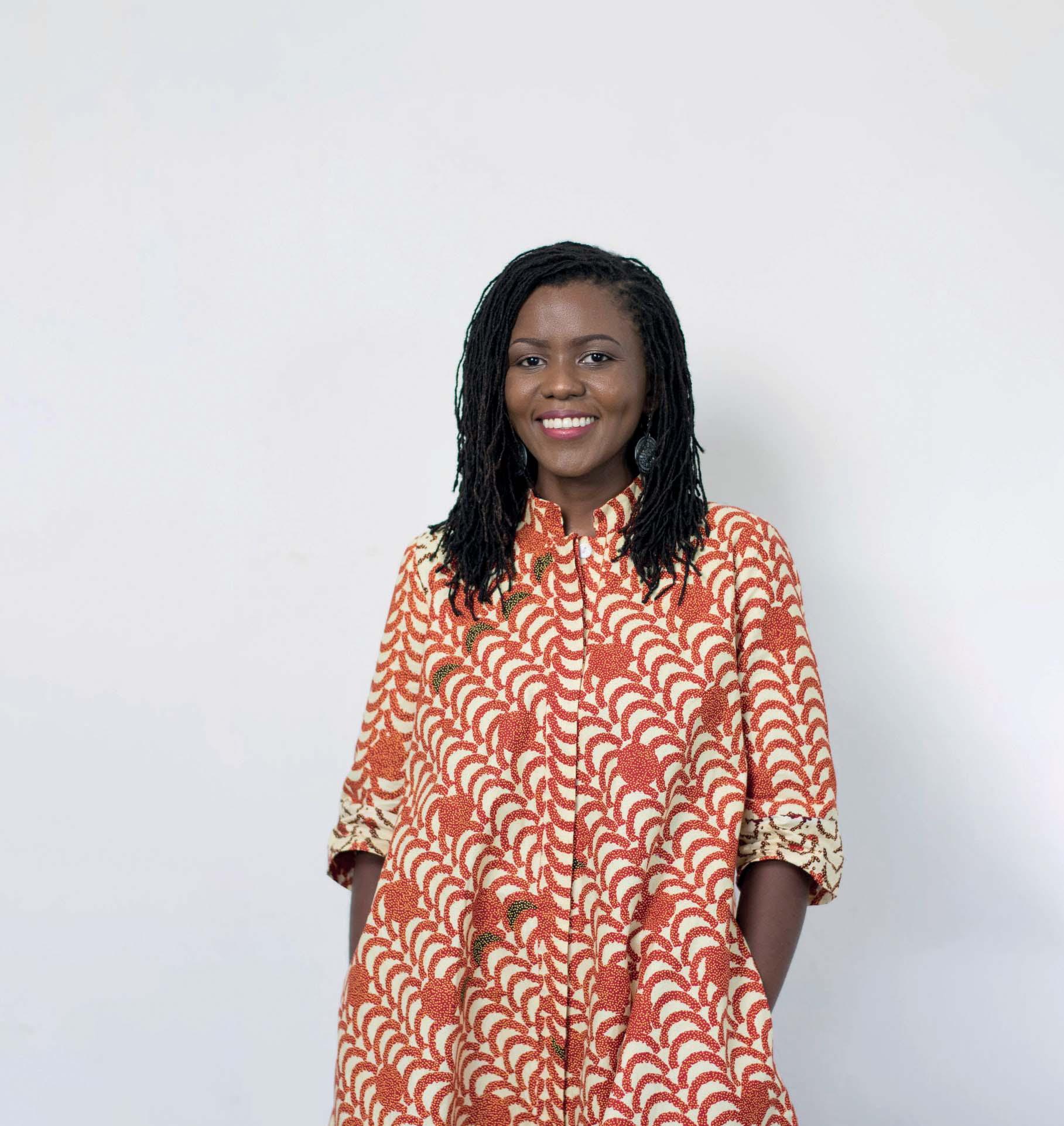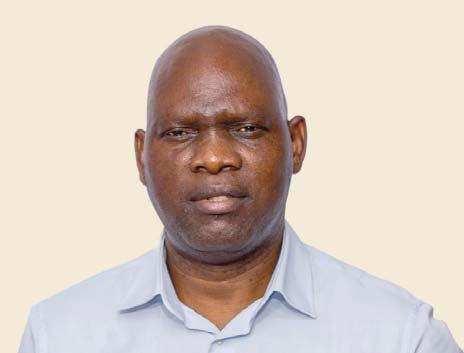
13 minute read
Changemakers
KENYA ENVIRONMENTALIST
Wanjira Mathai Carrying the green torch
Advertisement





Wanjira Mathai has been following in the footsteps of her illustrious mother, Wangari Maathai, who, in 2004, became Nobel Peace Prize for her work in preventing deforestation.
Wanjira recalls that with her mother leading the Green Belt Movement, her family planted trees at any excuse – their house was recognisable because of the amount of trees in and around it.
But her mother’s opposition to the cutting down of forests pitted her against the political and business elite of the day in Kenya and she was constantly harassed and, on one occasion, badly beaten.
Wanjira wondered whether all that pain was worth it and was not keen to join the movement. She studied in the US and worked there before returning home. She was about to leave Kenya when her mother won the Nobel Prize and all those years of pain were forgotten. She joined her mother as they travelled and lectured all over the world and met kindred spirits like King (then Prince) Charles of the UK.
Since then, Wanjira has put her heart and preventing deforestation. She is Global Partnerships at the World Resource Institute; a Leadership Council member of the Clean Europe Foundation.
But she says she feels frustrated at the slow pace with which the world’s leaders, especially in the rich North, are
“The Congo forest is the only true carbon sink of all the tropical forests in the world. We have to move fast, because our lives depend on the forest,” she says.
Given the rate of deforestation, time is of the essence and Wanjira will not stop agitating as vigorously as her mother before her for people to do the right thing.




SOUTH AFRICA CLIMATE CHANGE
Daniel Mminele Leading transition to clean energy

Ramaphosa named Daniel Mminele as the head of his Presidential Climate Finance Task Team, he sent an unmistakable signal about the scale of the task involved as well as his determination to see concrete results.
Mminele came to the job with impeccable credentials from previous was the Chief Executive, and the South deputy governor.
His duty in the position, announced estimated, requires some R1trn ($59bn) for its pivot away from coal, which accounts for some 85% of the country’s energy sources.
In particular, the team will oversee the Just Energy Partnership towards which Germany, France and other countries have committed $8.5bn at below-the-market rates to help South energy.
The success of this would provide an important model for similar partnerships – which means that Mminele will have more than South
GHANA IMMUNOLOGIST
Yaw Bediako Tailoring vaccines for Africa
KENYA AGRICULTURALIST
DRC LAWYER AND RESEARCHER
Jean Pierre Okenda Resources watchdog

Ghanaian Dr Yaw Bediako investigates the immune functions in order to gain important insights on how vaccines can be created more optimally to work for African populations for infectious and non-infectious diseases.
He is a researcher at the West African Centre for Cell Biology of Infectious Pathogens in Ghana and the Founder and CEO of Yemaachi Biotech. Bediako is a fellow of the Ghana Young Academy fellow for the Crick Africa Network, as African Academy of Sciences.
Although Africa has the highest number of infectious diseases, there is little capacity for vaccine development, so vaccines are tested on Caucasians in high-income countries, which may on Africans.
Bediako’s research and studies are devoted to building the capacity for vaccine development in Africa. His current work plans include using data, cellular and molecular analysis to investigate if the responses to the AstraZeneca Covid-19 vaccine populations.
He successfully created and launched tracker in Africa. With Bediako’s help, hopefully the situation where Africa lagged behind the rest of the world in its access to vaccinations during the pandemic may become a thing of the past, once there is the capacity to develop vaccinations on the continent Africans. Jean Pierre Okenda is a lawyer and industries governance. Okenda is an Extractive Industries for the NGO, Resource Matters.
In his role creating a platform for civil society organisations in the mining sector, he draws on his over 12 years of experience.
He was the Director of Extractive Industries at the National Resource Governance Institute (NRGI) in the US, where he worked to advance the Extractive Industries Transparency Initiative and supported legal reforms, as well as being the DRC Country Manager.
Prior to joining NRGI, he worked as a Deputy Program Coordinator at the advisor on extractive industries to the Dutch-based development organisation, Cordaid.
Okenda is recognised as a leader and innovator as well as a critical about good governance in the extractive industries in the DRC. In 2018, he was nominated and participated in the International Visitor Leadership Program run by the US Department of State. He continues to lend his expertise to international NGOs in areas including research and analysis, the impact of foreign direct investment on human rights, social development, advocacy, taxation, accountability, contract analysis, publication, and more.

Rather than choose between studying to serve the public or private sector, Amandla Ooko-Ombaka chose both. She graduated with a double degree from Harvard University – an MBA and an MPA in International Development.
With her ‘heart in the public sector and her mind in the private sector’, she is perfectly positioned as an Associate Partner at McKinsey & Company to work with private companies and governments across the continent to develop the agricultural sector in their countries.
Recognising that women play a large role in the chain of bringing food from farm to market, she believes that women should have access to funding and safety in the process.
Ooko-Ombaka is multifaceted – she co-authored McKinsey’s series on the Economic Impact of COVID-19 in Africa, has appeared in various media – such as Business Daily, Africa.com and the BBC – and regularly moderates at highlevel continental events on agricultural development, including the Tana Forum and African Green Revolution Forum (AGRF).
Before investing the last seven years at McKinsey, she was an economics lecturer at Strathmore University and served as strategy adviser to several global companies, governments and start-ups, including: the Kerry Group, the Government of Rwanda, GenPact, and the African Leadership Network. Amandla is a member of the Leadership Council at Harvard University’s Center for African Studies.


KENYA SCIENTIST
Rose M. Mutiso Restoring the equilibrium
Dr Rose M. Mutiso dreamed of the opportunity to study materials science and engineering, which she was able taxpayer-funded research. She is currently the Research Director of the Energy for Growth Hub, as well as Co-founder and CEO of the Mawazo Institute in Nairobi, which helps support the next generation of female scholars and thought leaders in East Africa to research developmental solutions.
Mawazo seeks to reverse the underrepresentation of women in academia and research. Through it, Mutiso aims to see more African women involved in shaping decision-making and public discourse on issues such as energy poverty.
Prior to her current position, she International Climate and Clean Energy at the US Department of Energy (DOE). Here she led the DOE’s engagement on technology and energy access in South Asia and Sub-Saharan Africa.
Previously, as an Energy and Innovation Policy Fellow in the Coons, she authored several pieces of legislation that were signed into law by President Barack Obama.
She has spoken on the energy Africa needs to develop and Adept at communications, Mutiso also co-hosts The high energy planet podcast, which addresses energy poverty. Mutiso’s Mawazo Institute helps support female scholars and thought leaders. Through it, she hopes to see more African women involved in shaping decisionmaking and public discourse.

ZIMBABWE VIROLOGIST
Sikhulile Moyo Discovered the Omicron Covid variant
Born in Zimababwe and based in Botswana, Dr Sikhulile Moyo is a virologist who, working with his team, existence of the coronavirus’ Omicron variant in November 2021.
Moyo is the Director of the Botswana Harvard Aids Institute Partnership (BHP), a lab and research associate at Harvard School of Public Health of Immunology and Infectious Diseases, and a member of Botswana’s Presidential Covid-19 Task Force team.
In November 2021 he noticed an unusual pattern in the Covid-19 samples which he shared with South African colleagues, who observed the same sequence and helped to identify the variant. His other contributions include studies on mother-to- child HIV transmission prevention, HIVexposed infants, monitoring HIV mutations associated with drug resistance, and studies on other infectious diseases, such as hepatitis, human papillomavirus (HPV), TB and norovirus.
Moyo has written over 150 published journal articles. This year he was included in Time magazine’s list of the 100 Most World.


UGANDA EDUCATOR
Odong Charles Kigundi Top teacher

Odong Charles Kigundi’s school, Wakadogo Primary School in Northern Uganda, made international headlines in October this year and won global recognition by becoming one of the Top 10 winners of the World’s Best School prizes for Overcoming Adversity.
Wakadogo school will receive a cash prize of $50,000, which Kigundi plans to invest in computer literacy and technology. The school was established in 2005 to help vulnerable children in the aftermath of a long regional civil war.
What started as a place to provide quality education for traumatised children expanded to include free healthcare and daily meals. As Kigundi explains, it has become a second home for many children in the area.
As the leader of the school, Kigundi is credited for his creativity and innovation, determination and perseverance in spite of the odds, the scarce resources and the risks to his safety.
During lockdown, teachers adapted and walked door-to-door where they taught children in small groups. The school is a friendly learning environment and children are provided with a space where they are allowed to dream again. Head Girl, Martha Kukunda hopes to one day “become a doctor so she can save thousands of lives.”
SOUTH AFRICA ENGINEER
Tshilidzi Marwala Marshalling AI in life sciences
Tshilidzi Marwala stands at the crossroads where technology meets education meets sustainable development. Currently the ViceChancellor and Principal of the University of Johannesburg, Marwala has been appointed Rector of the United Nations University in Tokyo as of March 2023. engineer, computer scientist and mechanical engineer. In today’s world where technology is the future, this knowledge is key. His appointment was partially based on his position as a thought leader and his multidisciplinary research interests, which include social science, computer science and medicine.
He has written several books, one of which was translated into Chinese, and appeared in international and local media such as The Economist, Time, CNN and the BBC, and given extensive talks.
This year in the Times Higher Education Impact rankings, under his leadership, the University of Africa and second in Africa. Prior to his current position he was Deputy Vice Chancellor, held various positions in academia and was a trustee of the Nelson Mandela Foundation.

CAMEROON LAWYER
Jacques Jonathan Nyemb Franco-African relations

Following in his father’s footsteps, Jacques Jonathan Nyemb pursued a career in business law after earning his baccalaureate in France and at the London School of Economics.
After a short stint at Harvard and sharpening his skills in Europe and America, he joined the family law President Emmanuel Macron to head the council established to follow up the recommendations of the New Africa–France Summit (CSRN).
CSRN covers more than just Cameroon-France relations but also Africa and Europe. It includes 12 members from Cameroonian and French civil society and is a platform to create dialogue, raise awareness and provide advocacy and training.
Even though Nyemb is in a liaison role between France and Africa, his position is that the relationship should be collaborative rather than one of relationship between Africa and its former colonial powers and advises African youth to “chart their own course rather than relying on external actors”.
Giving back is also a Nyemb family trait. He supports youth entrepreneurship and in 2008, founded the Mackenzie Foundation, named after his grandmother, to empower women in Cameroon’s rural areas. During the pandemic, he created the Okwelians, a think-and-do tank, a community of approximately 450 Cameroonians at home and in the diaspora, seeking to bring about lasting social change.

Nyemb is in a liaison role between France and Africa at CSRN, but his stance is that the relationship should be collaborative rather than one of reliance.
MOZAMBIQUE ACTIVIST
Prof. Adriano Nuvunga Indefatigable warrior against corruption
Prof.
against corruption as a civil society activist in Mozambique. As the Director of CDD, the Centre for Democracy and Development, he leads an organisation which focuses on democracy, youth, leadership and development policy, seeking change and transformational leadership.
He was previously the Head of the Centre for Public Integrity (CIP), a civil corruption and transparency in the Mozambican elections and government.
He holds a PhD in Development Studies from the International Institute of Social Studies at Erasmus University Rotterdam, Netherlands. change in the next generation, Nuvunga is a professor teaching political science and government in the Department of Political Sciences and Public Administration at Eduardo Mondlane University in Maputo.
He has published articles stressing accountability in governance and a call for social and political action. Although he has been a vocal and highly visible critic of corruption, despite the dangers of exposing it, he remains a passionate advocate for integrity and human rights.

BOTSWANA TRAILBLAZER
Bogolo Joy Kenewendo Leading climate change transformation
When Bogolo Joy Kenewendo was appointed as Minister for Investment, Trade and Industry of Botswana by President Mokgweetsi Masisi in 2018 at the age of 31, she became the youngest Cabinet Minister in Africa.
In June, she was appointed as the UN Climate Change High-Level Champions’ Special Advisor, Africa Director to lead the plan for delivering a transformative COP27, and help shape the Champions’ strategy for accelerating ambition and action in the region. It is a critically important position at a time when Africa, and the rest of the world, is facing climate-induced catastrophe.
Fighting climate change involves regional and local collaboration which African trade and investment strategy and increase continental innovation.
She aims to use her role as a platform to assist in elevating the voices of women and youth in the goal to halve emissions by 2030. The appointment is part of the Climate Champions Five-year Plan with the Marrakech Partnership to include voices of the most vulnerable and marginalised from across the globe.
Kenewendo is Managing Director of Kenewendo Advisory, and a Fellow with the Center for Global Development. She is also a member of the G7 Gender Equality Advisory Council, a special envoy to the G7 and G20, and a member of the UN SG’s Common Agenda project on the Gender Architecture of the UN and the Group on Sustainable Financing.










